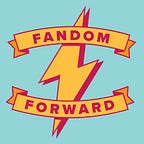Answers to Your Questions About Defending Books
This summer, Fandom Forward is encouraging everyone to become Book Defenders and learn the skills needed to protect the universal right to book access. One way we’ve been doing that is providing free, public trainings, such as our recent panel: How to Effectively Fight Against Book Bans!
The panel was viewed live by a passionate and engaged audience with so many great questions for our expert panelists. So many great questions, in fact, that we ran out of time to answer them all during the panel! Alaina Lavoie from We Need Diverse Books was kind enough to answer your questions after the panel.
To get more involved in Book Defenders, take a look at our upcoming events here, download the Book Defenders toolkit, and while you’re at it, snag one of our rad “We’ll Keep Reading” shirts, join our book club, or donate directly to Fandom Forward to help us continue defending books all summer. When you take any action to defend books, don’t forget to submit your points to help your house (based on your favorite book genre) win the Book Defenders Cup!
Without further ado, here are the answers to your questions!
—
How can we encourage literacy to kids while book fairs are also being banned in many schools?
AL: In any place you can, encourage freedom to read. Supply the kids in your life with books. Fight for and advocate for community access to books, whether it’s in schools or at local libraries. Host your own literacy focused events, and contact authors to set up author talks with students and kids. Start a Little Free Library in your community and include a wide variety of diverse books in them.
We’ve been talking a lot about how the bans impact young kids/teens, which is super, super important, but I’m curious if we are seeing these bans impact adults too (like in colleges/workplaces/prisons)?
AL: Book bans absolutely impact adults. Adults are also a huge population of library patrons, and book bans impact libraries. Book bans make it so that it might be harder to find a certain book in your area, whether you shop at a bookstore or use libraries. Book banning has affected Little Free Libraries as well, with people in some areas removing certain titles from their community’s Little Free Libraries. If someone lives in a book desert or an area where there’s lower access to libraries and bookstores, book bans might affect them even more.
For those who are incarcerated, book bans have a major potential impact because they already have decreased access to choose whatever reading materials they want, and the prison that they are incarcerated in can limit their access. Incarcerated adults and teens in juvenile detention centers already have an incredibly hard time finding a wide variety of books, and a ban in the local community or a ban at the prison might make it so that they can’t read the books they really want to read. This is a limitation on First Amendment rights for incarcerated folks, who are already strongly impacted by a loss of human rights both during their time in prison and afterward (due to discrimination against formerly incarcerated people).
Would there be value in “rebranding” Banned Books Week to focus on Freedom To Read? Some low-informed patrons misunderstand Banned Books Week and fail to understand the First Amendment focus.
AL: I believe the most important thing is increasing access to books and making sure people know their rights and understand that they can be advocates in their community, so whatever message will help people get there is one that I’d support. If using the word freedom makes this more accessible to people, then I think that’s a great thing. In rebranding these events, however, I think it would be helpful to include a basic education that banned and censored books are not inherently bad, and to inform people more widely about the real reasons why books are banned. Using examples of popular, beloved titles that have been banned, it can be helpful to use an accessible word like ‘freedom’ to then get folks to understand that banning books does take away our fundamental human rights.
